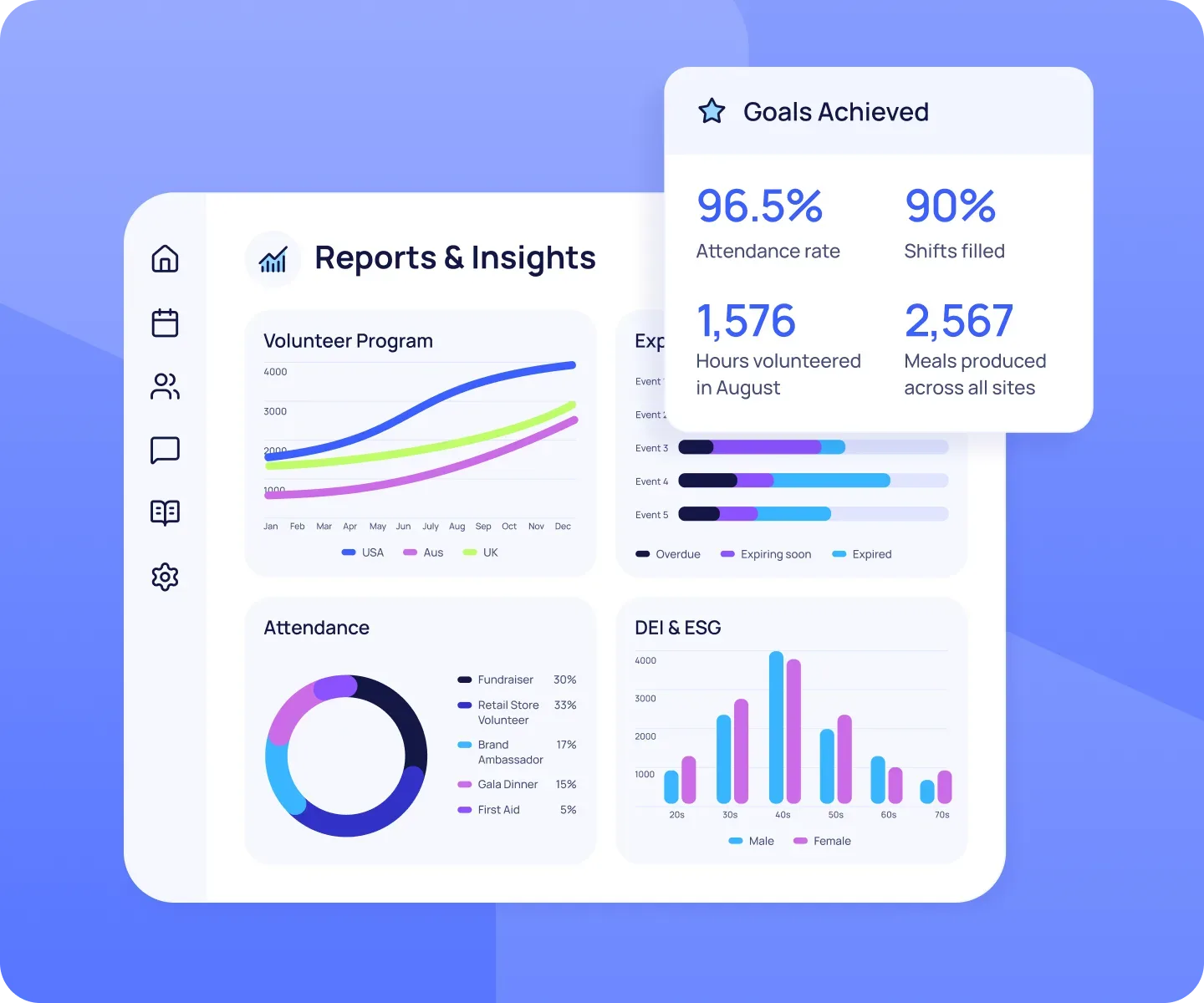Automated onboarding, personalised experiences
Streamline onboarding without losing the personal touch. With Rosterfy’s automated tools, you can deliver consistent, engaging onboarding that’s personalised to every volunteer’s journey.

Empower your cause to do more good. With Rosterfy, ensure compliance, grow your impact, inspire volunteers, and raise more funds, all from one powerful platform.

Used by 5 million+ volunteers and staff worldwide, Rosterfy enables organisations with volunteers at their heart, to scale with confidence and amplify their impact.





With the world’s most powerful automation engine, seamless CRM connection, 50+ integrations, and built-in impact measurement, Rosterfy streamlines volunteer management so non-profits scale sustainably and deliver a world-class experience for their volunteers.
Eliminate repetitive admin. Reduce errors, free your team to engage with your volunteers, and focus on delivering meaningful impact.
Deliver a world-class, seamless and personalised experience that inspires and empowers your volunteers.
Nonprofits who use a CRM including Blackbaud, Salesforce or Hubspot can connect with Rosterfy to ensure up to date data across multiple platforms.
Streamline onboarding without losing the personal touch. With Rosterfy’s automated tools, you can deliver consistent, engaging onboarding that’s personalised to every volunteer’s journey.

Equip your volunteers for success with flexible, user-friendly online training that’s consistent, engaging, and fits seamlessly into their schedule.

Spend less time buried in spreadsheets and manual processes, and more time driving real change. With Rosterfy the scheduling of volunteers is automated, streamlined, and stress-free - so you can focus on what matters most: engaging your volunteers and maximising impact.

Make volunteer recognition effortless. Whether it’s e-badges, certificates, merchandise, ticket discounts or gift vouchers, Rosterfy helps you create a rewarding experience that keeps volunteers engaged.

Gain clear insights into volunteer activity, engagement, and impact. Rosterfy’s reporting tools help you make informed decisions, recognise contributions, and optimise every opportunity to create meaningful experiences.


Rosterfy enables non-profits to build customized, automated workflows to onboard each of their varied volunteer roles.
With integrated vulnerable sector or background checks, volunteers progress automatically based on their activity, ensuring everyone is screened and compliant.

Unify your data and operations with a single source of truth across every department. Seamlessly integrate Rosterfy with your existing CRM including Salesforce, Blackbaud, HubSpot, and Microsoft Dynamics as well as your donor management systems. The result? A streamlined experience for administrators and volunteers alike, with one central portal to manage all engagement and operational activity.

Give your volunteers the tools to succeed with easy-to-access in-built online training and LMS integrations that keeps them engaged, confident and compliant. Track completions, automate reminders, and set up automated workflows that prevent or remove access based on training being completed or renewed.


Enterprise grade security and compliance trusted by leading organizations worldwide
Learn more



Take a look at how World Scouting replaced fragmented systems and manual processes with a centralised solution, streamlining coordination, boosting efficiency, and improving the volunteer experience across the board.

Take a look at how WaterAid partnered with Rosterfy to streamline volunteer management, strengthen compliance, and enhance engagement across its global fundraising and campaigning programs.

"After one week of using Rosterfy, our recruitment office can process 10-12 volunteer applications per hour, as opposed to 3-5 volunteers per hour, through our previous system."

Take a look at how British Heart Foundation streamlined volunteer management, halved onboarding time, and delivered £200,000 in cost and efficiency gains using Rosterfy.
From CRMs to fundraising launchpads, social sharing channels and accessibility extensions, Rosterfy allows you to seamlessly integrate with the tools that you love.











Access real-time dashboards and custom reports that bring your volunteer program to life.
Use Rosterfy’s built-in reporting tools or connect with platforms like Microsoft Power BI and Google Analytics to gain instant visibility into diversity and inclusion, as well as community impact with actionable insights that inspire progress and demonstrate meaningful change.

Struggling to attract the right volunteers? Rosterfy makes it easy to connect your non-profit with corporates, sporting clubs, and community groups.
Create branded invitation links to streamline recruitment, assign specific shifts or roles to different groups, and nominate Team Leaders to coordinate scheduling and recruitment on your behalf, helping your volunteer program grow faster and smarter.
Book a short discovery call with our team to learn how Rosterfy can help your nonprofit better connect with, manage, and inspire your volunteers.
